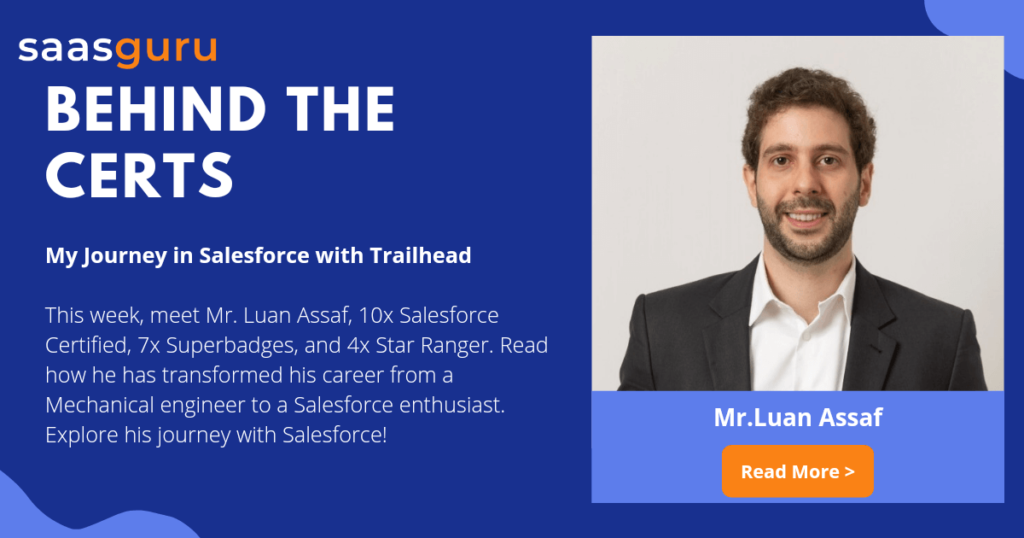SG: Let’s get started. Why don’t we start from the beginning? Please tell us about your education/ career before entering the Salesforce ecosystem.
LA: I graduated in Mechanical Engineering, working in the areas of sales, maintenance, and quality in large companies in the metallurgical and engineering industry.
SG: That’s awesome. Now we would love to know what was the tipping point when you said, “I want to make this change,” and what was the trigger for that?
LA: After getting the feel of a great professional experience, I realized that engineering was not for me. So, I decided to look for other challenges and relocate myself to a different job market. After that, I started my journey in a consultancy as a trainee consultant, where I had my first contact with the Salesforce ecosystem. From there, I dedicated myself to studying and making the most out of projects offered to me, focusing on improving my technical and analytical skills.
Currently, I am a Salesforce Technical and Solution Architect and Marketer at a large Financial Service organization. I see it’s an excellent opportunity to improve my skills and knowledge.
SG: You achieved many certs along the way. Can you share three things with us?
1. Why do you value certificates?
2. What are the challenges associated with the process?
3. What are your top tips for being successful in cert exams?
LA: Yes, sure.
Certifications have always been tests to assess my theoretical knowledge about a particular area/cloud. Still, it is not always the best way to measure a professional’s expertise on the subject. Experience in dealing with adversities and bringing solutions determines knowledge in practice.
It is notable that the process of obtaining certifications becomes more important than the certification itself. Learning about the theoretical part and updating with releases prepares you for all the professional challenges that are required during the implementation and execution of daily tasks.
Certification is a way to validate all the learning acquired in this process and from your past experiences in your career. The junction between theory and practice is crucial to succeeding in this journey.
The key to success is constantly being updated with new features and having a study routine. You also must be able to exchange knowledge with colleagues and engage with communities connected to Salesforce, which makes the process of obtaining certification easier.
SG: What do you enjoy most about your work as a certified Salesforce professional?
LA: It is being able to understand the needs of the business and its users, identify points for improvement and bring solutions that facilitate the work. With this, the recognition of my work is imminent and increasingly encourages everyone involved to dedicate themselves more to the common good.
SG: Time for gratitude!! Finally, is there anyone (individual or company) that you would like to take this opportunity to thank for their role in helping you along your journey? If Yes, what was their role in your success?
LA: It is difficult to speak individually of each person who has been with me in recent years. There were several experiences and challenges which somehow provided me with some teaching.
I am very grateful to my former manager/mentor, who was my biggest supporter and teacher for my personal and professional development.
For me, it is extremely important to be surrounded by people who are willing to teach and share experiences. I believe that the best way to learn is by teaching! So, keep studying and sharing your knowledge.

